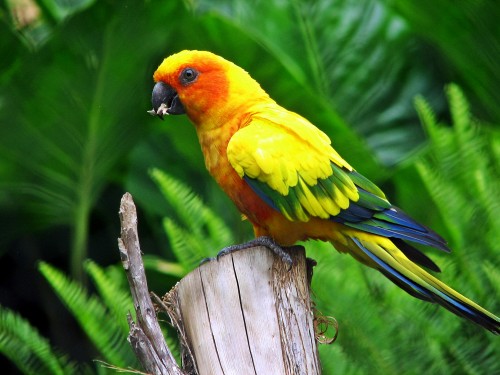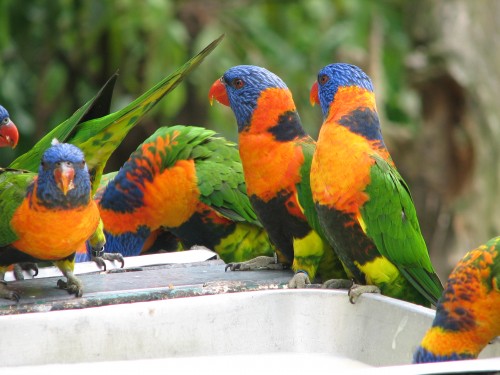Let the birds inspire you
I have to admit that birds inspire me. Not only do I write regularly about them on my site Trevor’s Birding, I also use every opportunity to get out into the the garden or the surrounding bushland to watch and photograph birds. I also enjoy visiting various zoos around Australia. Some of these, like my home zoo in Adelaide, have walk through aviaries which make the photography of birds a little less challenging, and often very rewarding.
Because of my love of our many wonderful birds here in Australia I have found myself writing frequently about them, not just on my birding site. I have written dozens of poems about them as well as featuring them in short stories and in my novels. Somehow, some of them always creep in – almost uninvited. As a spin-off from my writing and photography I also get many requests to be a guest speaker, showing my bird photos to community groups. Publishers now send me books about birds to review which is a delightful bonus.
Birds can be inspiring to everyone. Even if you are not as obsessive about them as I am, I’d recommend that you take time out to not only smell the roses, but to also watch the birds. If you lack bird life in your neighbourhood, seek out a nearby park, lake, swamp, zoo, river or seashore. Sit and watch the birds going about their daily activities. Let their beauty inspire you. You may find that just being near these wonderful creatures is enough to refresh you for your next writing session. You don’t have to even write about them.
Good writing.
Take time out from writing to relax
Writing is not only a lonely occupation, it can be exhausting. Sitting at the keyboard for many hours each day is not only mentally draining, it can actually be physically demanding.After four or five hours of being on the creative edge, the body screams for a change of some kind.
I find that long writing sessions can actually be counter productive. The ability to continue being creative wanes and the brain starts to switch off. As an aside, I find that managing my diabetes is quite a challenge while writing as I can easily get very drowsy.
Sometimes I just need to take a complete break and have nap – just like my friends at my local zoo shown in the photos on this post. Often a 20 minute nap refreshes me enough to keep on going for several more hours.
Ideas to help you relax
I did a little brainstorming and came up with a few ideas on how you could take a break from writing and refresh the creative juices. Here’s my list:
- Take a nap – but not too long.
- Go for a walk. The fresh air and exercise will do you good.
- Visit the local river, lake, park or lookout and let the environment inspire you afresh.
- Meet a friend for coffee.
- Make a cup of tea or mug of coffee and sit in the garden and let the plants inspire you.
- Read an inspiring book.
- Weed the garden.
- Water the lawn or your pot plants.
- Watch the birds going about their daily activities.
- Take some photos of flowers in your garden.
- Go for a bicycle ride.
- Have a light snack.
- Listen to your favourite music and let it inspire you.
- Sit in the sun and relax while you soak up some vitamin D.
- Go for a swim, visit the gym or just do some simple exercises to get the blood flowing to your brain.
I hope some of these ideas help you, because most of them have helped me on many occasions.
Reader activity: What do you do to relax during long writing sessions? Please share them via the comments. Thanks.
One last hint: get back to writing!
An inspirational effort
I don’t get too many opportunities to watch sport on television these days but when I do I am often inspired by the efforts of elite athletes.
Over the last week I have been watching the television coverage of some of the events in the Commonwealth Games in Delhi, India. These games, like the Olympics, are held every four years in a country belonging to the Commonwealth of Nations. The countries involved include Australia, England, Wales, Scotland, South Africa, New Zealand, Canada and many of the other countries that once made up the British Empire. The Commonwealth Games are often referred to as The Friendly Games with a much more relaxed approach to the event. Competition in the field and pool are still fiercely competitive despite this friendliness, and many records, including world records, are broken.
It is pleasing to me that a country like Australia with a relatively small population base does so well in these and other games. During the last Commonwealth Games in Melbourne in 2006 Australian athletes won more gold medals than the next four best countries combined. The trend this time is going the same way again though host nation India is having a big impact on the results.
During any games events there are many outstanding athletic achievements. Several competitors have already gained three or four gold medals with still five days of competition to go. One effort, however, stands out for me. Australian swimmer Ben Austin is not a household name even here in Australia. A few days ago he won a gold medal in the 100 meter freestyle event. His time would have won every gold medal in this event up to the 1974 Commonwealth Games.
So what, you ask?
Ben happens to have only one arm.
Ben swims in the EAD events. EAD stands for Elite Athletes with a Disability. His classification is S8 (above elbow amputee). His times are not all that far behind swimmers with two arms. What an achievement. And how inspirational is that achievement?
What has this got to do with writing? Too often writers – me included – grumble when things go wrong, a story is not developing as we’d like it, we have a headache, a poem gets rejected by a publisher or some other minor inconvenience and we feel like giving up. It is times like this we need to remember the Bens of this world. He has achieved great things despite having only one arm. And what about theswimmer in the last Paralympics who won the hearts of so many because he swam the length of the pool with NO arms?
Don’t give up – Good writing.





